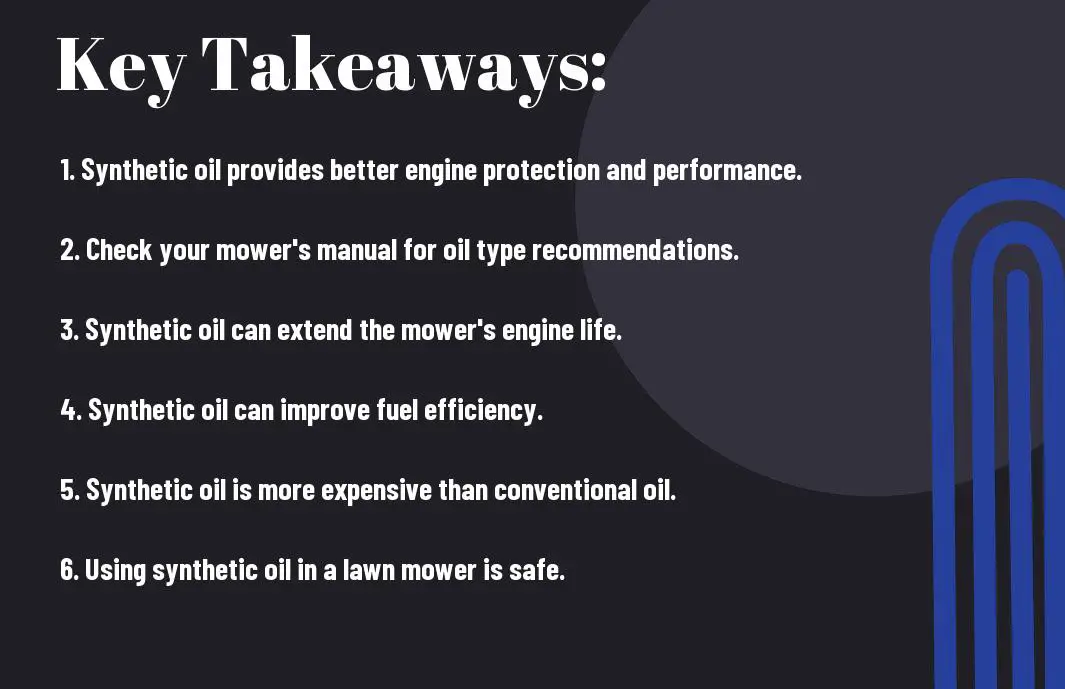With the advancement in oil technology, many lawn mower owners wonder if synthetic oil is suitable for their machines. In this comprehensive guide, we will explore the benefits and potential drawbacks of using synthetic oil in your lawn mower. Understanding the intricacies of lawn mower engines and the characteristics of synthetic oil will help you make an informed decision for optimal performance and longevity of your equipment. Let’s look into whether synthetic oil is a suitable choice for your lawn mower.
Key Takeaways:
- Synthetic oil can be used in a lawn mower: Synthetic oil is a viable option for use in lawn mowers as long as it meets the manufacturer’s requirements and specifications.
- Benefits of using synthetic oil: Synthetic oil offers better lubrication, improved engine performance, and enhanced protection against wear and tear, especially in extreme weather conditions.
- Consult the owner’s manual: Before switching to synthetic oil, always refer to the lawn mower’s owner’s manual to ensure compatibility and to avoid any potential issues.


Understanding Your Lawn Mower’s Engine
Types of Lawn Mower Engines
It is important to understand the type of engine your lawn mower has to ensure you use the correct oil. Different engines may require specific oils to operate efficiently. Recognizing the type of engine will help you determine which oil is compatible with your mower.
| Engine Type | Oil Recommendation |
| Gasoline Engines | Synthetic or conventional oil |
| Diesel Engines | Specific diesel engine oil |
| 2-Stroke Engines | 2-stroke oil mixed with gasoline |
| Electric Motors | Non-oil lubricant |
| Hybrid Engines | Consult manufacturer’s recommendations |
Manufacturer Recommendations
On newer lawn mowers, manufacturers often provide specific recommendations on the type of oil to use in the engine. It is crucial to follow these guidelines to ensure optimal performance and longevity of your mower. Ignoring manufacturer recommendations may void warranties or cause damage to the engine.
Recommendations may include the viscosity grade, such as 10W-30 or 5W-30, and whether synthetic or conventional oil is preferred. Always refer to the owner’s manual for the most accurate information regarding oil choices for your lawn mower’s engine.

Benefits of Using Synthetic Oil in Lawn Mowers
Extended Engine Life
Your lawn mower’s engine is a vital component that requires proper care to function efficiently. Using synthetic oil in your lawn mower can significantly extend the engine’s life. Synthetic oil has superior lubricating properties compared to conventional oil, reducing friction and wear on engine parts. This results in less heat buildup and better overall engine performance, ultimately leading to a longer lifespan for your lawn mower’s engine.
Improved Engine Performance
Using synthetic oil in your lawn mower can also lead to improved engine performance. Any engine, including those in lawn mowers, can benefit from the enhanced protection and lubrication that synthetic oil provides. Synthetic oil maintains its viscosity better in extreme temperatures, ensuring smoother engine operation in hot summer months or during cold winter starts. This improved lubrication can lead to better fuel efficiency, reduced emissions, and overall smoother operation of your lawn mower.
Considerations When Switching to Synthetic Oil
Compatibility Issues
For those considering making the switch to synthetic oil in their lawn mower, compatibility issues are an important factor to keep in mind. Synthetic oils are formulated to work with a wide range of engines, but it’s crucial to check if your specific lawn mower model is compatible with synthetic oil. Some older or less advanced engines may not be able to handle the lighter weight and different additives found in synthetic oils.
The Right Time to Switch
Right timing is crucial when transitioning to synthetic oil in your lawn mower. While synthetic oils offer better protection and performance, switching at the wrong time can lead to issues. It’s recommended to make the switch to synthetic oil when your lawn mower is brand new or after a recent oil change with conventional oil. This ensures a clean slate and prevents any potential compatibility issues between the two types of oils.
Another important consideration when deciding the right time to switch to synthetic oil is the age and condition of your lawn mower. If your machine is on its last legs or has been running on conventional oil for a long time, it might not be the best candidate for the transition. In such cases, sticking with conventional oil until it’s time for an upgrade may be the wiser choice.
How to Choose the Right Synthetic Oil for Your Lawn Mower
Viscosity Ratings and What They Mean
Many factors contribute to choosing the right synthetic oil for your lawn mower, with viscosity being a crucial consideration. Viscosity ratings determine the oil’s thickness and flow characteristics at different temperatures. When identifying synthetic oil for your lawn mower, look for a viscosity grade recommended by the manufacturer in the owner’s manual. Using the correct viscosity ensures optimal performance and protection for your mower’s engine.
Quality Standards and Certifications
Any reputable synthetic oil for lawn mowers will meet industry quality standards and certifications. These standards, like the American Petroleum Institute (API) designation and the Society of Automotive Engineers (SAE) rating, ensure that the oil has undergone rigorous testing for performance and reliability. Choosing oils with these certifications guarantees that your lawn mower’s engine is getting the best protection and lubrication possible.
They provide assurance that the oil meets the necessary requirements for your lawn mower’s engine, including resistance to oxidation, proper lubrication, and protection against wear and corrosion. Be sure to check for these quality standards and certifications when choosing a synthetic oil for your lawn mower to ensure optimal engine performance and longevity.
Mower.
To wrap up
Upon reflecting on the question, “Can I use synthetic oil in my lawn mower?” it is clear that synthetic oil can indeed be used in lawn mowers, provided it meets the specifications recommended by the manufacturer. Synthetic oil offers numerous benefits such as better engine performance, improved protection against wear and deposits, and extended oil change intervals. By choosing the right synthetic oil for your lawn mower, you can ensure optimal performance and longevity for your equipment. Remember to always refer to the manufacturer’s guidelines and consult with a professional if you are unsure about which oil to use for your specific lawn mower model.
FAQ
Q: Can I use synthetic oil in my lawn mower?
A: Yes, you can use synthetic oil in your lawn mower. Synthetic oils are designed to provide better protection and performance compared to conventional oils.
Q: What are the benefits of using synthetic oil in a lawn mower?
A: Synthetic oil offers improved engine protection, enhanced performance in extreme temperatures, reduced engine wear, and extended oil change intervals.
Q: How do I know if synthetic oil is compatible with my lawn mower?
A: Refer to your lawn mower’s owner’s manual to check if synthetic oil is recommended by the manufacturer. Most modern lawn mowers can safely use synthetic oil.
Q: Can I switch from conventional oil to synthetic oil in my lawn mower?
A: Yes, you can switch from conventional oil to synthetic oil in your lawn mower. It is safe to make the switch, but ensure you follow the manufacturer’s recommendations on oil viscosity.
Q: Is synthetic oil more expensive than conventional oil for lawn mowers?
A: Yes, synthetic oil is typically more expensive than conventional oil. However, the benefits it provides in terms of engine protection and performance can outweigh the higher cost for many users.
